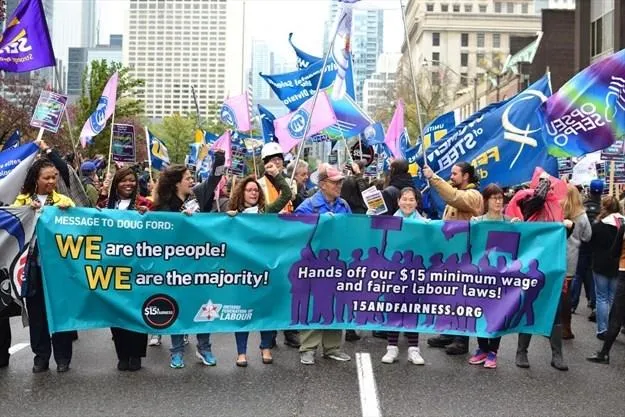Hundreds rally against Ford’s plans to repeal Bill 148, cancel January wage hike to $15.

Protesters rallied across the province Monday urging Premier Doug Ford not to scrap new worker protections after he pledged earlier this month to repeal the law giving Ontarians two paid sick days, equal pay for equal work and a minimum wage bump.
In Toronto, at least 200 protesters gathered outside the Ministry of Labour in support of a $15 minimum wage, currently scheduled to come into effect in January. Ford has pledged to freeze it at $14 and scrap the rest of Bill 148, which was enacted late last year to tackle the rise of precarious work.
"I have the same bills as most families and I'm struggling to pay them," said Christine, who addressed Monday's rally and is only being identified by her first name for fear of reprisal at one of her four minimum-wage employers.
"We've been prisoners in our homes because, aside from work, we can't afford to go anywhere. Who lives like that?"
The Ontario Chamber of Commerce has called for a "full repeal" of the new legislation, which it says has "created a number of compounding changes that created greater administrative and financial pressure on employers."
At Queen's Park Monday, Ford said the minimum wage hike from $11.60 to $14, which took place earlier this year, increased payroll costs by 22 per cent — and that a further bump to $15 in January would increase them by 32 per cent.
"I'm guessing already 60,000 people have already lost their jobs," he said.
On a year-over-year basis, employment increased by 1.1 per cent, or 79,000 jobs, in Ontario in August, according to Statistics Canada.
In addition to increasing the province's minimum wage, Bill 148 provided two paid, job-protected emergency leave days for all workers, increased holiday entitlement, mandated equal pay for casual and part-time workers doing the same job as full-time employees, enshrined, improved scheduling protections and boosted protections for temp agency workers.
The legislation represents the most sweeping change to the province's labour laws in decades, and was implemented after two years of research and public consultation conducted by two independent labour experts. About one-third of Ontario's workforce are vulnerable workers in low-wage, precarious employment, according to the final 400-page report written by the two experts about proposed labour reforms.
"It's not realistic. We're going to create good-paying jobs. We're going to make sure that the part-time person gets treated very well," Ford said in response to questions in the legislature from New Democrat MPP Sara Singh (Brampton Centre).
"But you have to keep in mind the person that's been working there 15 years. You can't treat a part-timer the same way."
Monday's rally was spearheaded by unions, worker advocates, and the Fight for $15 movement, which has successfully fought for a higher minimum wage and other protections for precarious workers in cities like San Francisco, Seattle and New York.
"We are not willing to turn the clock back to 40 years ago" said Deena Ladd of the Toronto-based Workers' Action Centre. "This is not asking too much. These are basic rights."
United Steelworkers Union International vice-president Carol Landry told the crowd outside the Ministry of Labour she could "not believe in 2018 these are the choices we are giving working families."
"Our message is, Premier Ford, do the right thing."
Gilleen Pearce, who owns a Toronto-based dog walking service, said she attended the rally because the "Chamber of Commerce does not speak for everyone."
"The narrative about business has 100 per cent been hijacked by right-leaning, anti-worker voices," said Pearce, who is also the spokesperson for the Better Way Alliance — a group of Ontario employers that supports Bill 148.
"I don't want workers to feel all business owners are against them."
At another action orchestrated by Toronto teachers, Roopa Cheema said she was worried about the potential impact on her students if the bill is scrapped.
"This minimum wage issue is an education issue because our students' living conditions are their learning conditions," she said, adding many of her high school students from low-income households are working to pay their families' bills.
"They are coming to school hungry and exhausted and stressed and anxious," she said. "These are not high school students saving to go to university. They're working to keep the lights on."
With files from Robert Benzie
Sara Mojtehedzadeh is a Toronto-based reporter covering labour issues. Follow her on Twitter: @saramojtehedz
